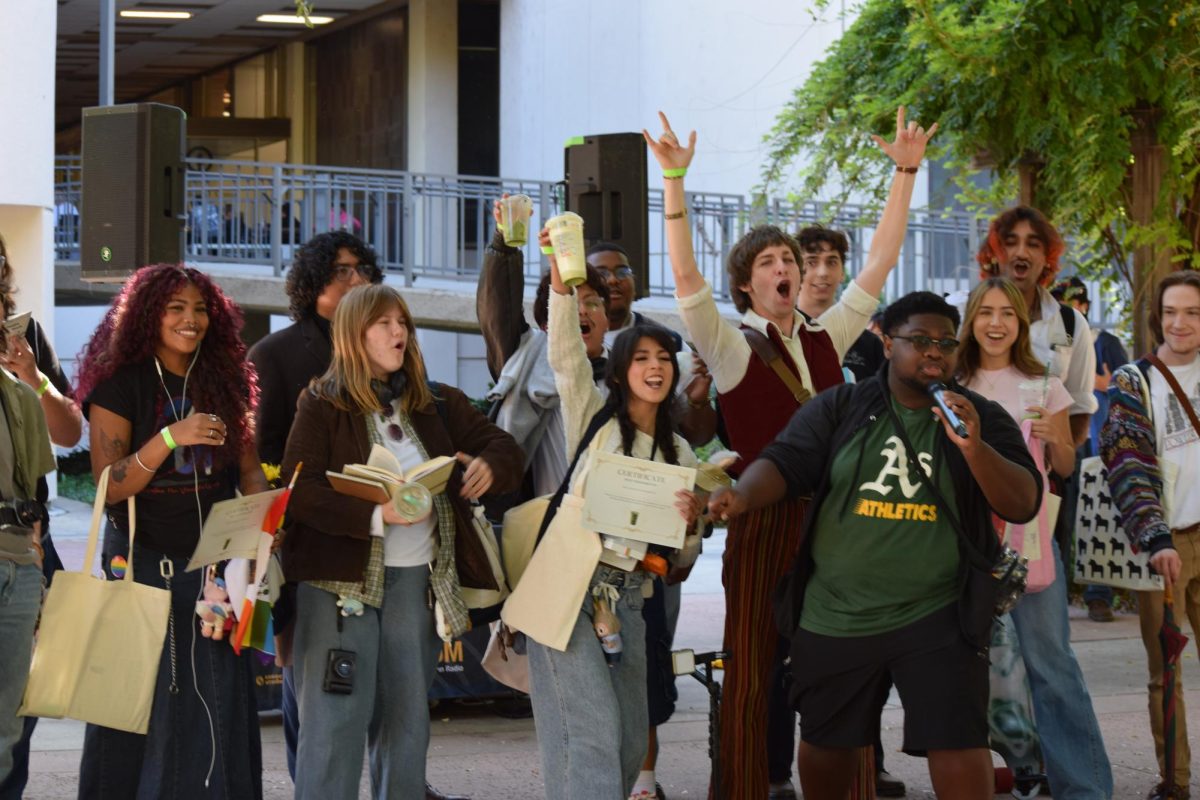ASI to relocate Serna Plaza to library quad
September 22, 2004
Can anyone remember the last time 10,000 people gathered at Sacramento State’s quadrangle for a guest speaker?
The State Hornet has proof. In an issue published Oct. 18,1984, 10,000 people crowded into the quad outside the library to hear Geraldine Ferraro, democratic candidate for vice president, campaign on foreign and domestic policies.
Associated Students Inc. wants to bring back that magnitude of involvement and start a fund-raising campaign to reinforce the quad as a public forum and place for student events. In addition, board members look to dedicate the quad to Joe Serna Jr., alumnus, teacher and public servant.
“(Serna) demonstrates what a student can do with a B.A. from Sac State,” said Dr. Jon Syer, government professor.
ASI voted Sept. 15 to relocate the Serna Plaza outside the University Union. Plans to dedicate the quad to Joe Serna Jr. and make it a place for students to come together are underway.
“There needs to be many venues to honor him,” said Rhonda Rios Kravitz, interim director of the Serna Center, located on the first floor of the library. ASI wants to finance the project without raising student money and also plans to enlarge the fountain.
Serna, remembered by many as being a very successful and passionate man, died of kidney cancer on Nov. 7, 1999, having survived the previous nine years with one kidney.
He left behind a saga of hard work, tenacity and determination.
A young farmer, Serna graduated Sac State in 1966 with a B.A. in social science and government and became an activist with the United Farm Workers of America, founded by Cesar Chavez.
“For more than 30 years, Joe championed the United Farm Workers in Sacramento,” said Arturo S. Roderiguez, president of UFW, in a statement at Serna’s funeral on Nov. 10, 1999. “(He) always dropped whatever he was doing to respond … his roots were with the farm workers. Joe Serna never forgot where he came from. And to his dying day, he never stopped caring for the people whose plight he had shared.”
Immediately after graduation, Serna left for Guatemala to serve in the Peace Corps, where he helped the unfortunate and struggling native Mayan Indians. <
He returned in 1969 and became a faculty member at Sac State, teaching classes in government and politics where he soon received the CSUS Distinguished Faculty Award.
Marc Grossman, communications director for UFW, had been Serna’s neighbor and friend.
“He would work late at night and on the weekends grading papers,” Grossman said. “He was driven. He got a college education, which was a real achievement in those days.”
Serna also participated in the public sector. He was elected to the Sacramento city council in 1981 and remained active until 1992, when he decided to tackle the position of mayor.
As a representative of Sacramento, Serna kept busy and productive, fulfilling the city’s expectations and breaking the mold.
“Sacramento has always had a weak mayor system, where most of the power is placed in the city manager. Joe pretended like he was a big city mayor would drive the agenda,” Grossman said. “He was an activist. He would say the mayor was not just there to take up space. He wasn’t afraid to risk political capital.”
Serna reformed the city school system, taking on the school board that he felt ignored children who were failing. He fought to fix the many problems young students faced with broken bathrooms, inadequate air conditioning, vandalized buildings and shortage in books.
“He appointed a commission that would come up with a solution,” Grossman said. “When the school board wouldn’t listen, he got a new one, eliminating even his friends that were on the board. It didn’t matter to Joe. What counted was the kids.”
Serna also served on numerous public boards and commissions. He was a member of the Sacramento Metropolitan Arts Commission, the state commission for the revision of the election code, the Citizen’s Committee on Local Government and Reorganization, the Sacramento Housing and Redevelopment Commission and a member of the Sacramento Hispanic Chamber of Commerce, to name a few.
Sac State has a lot of thanks to give for Serna’s relentless hard work and dedication as a distinguished faculty member, valued teacher and contributor to the college programs.
Serna was a member of the Academic Senate, the Advisory Board of Campus Radio KXPR and the Chicano Faculty and Staff Association, among other campus bodies. He was a mentor to hundreds of students preparing for careers in the public service and journalism and raised countless funds for Sac State’s School of Business, Alumni house, 2000 Olympic Trials, government department and special collections in the Library.
“I think we want a place that has high visibility for Joe Serna as he was such an inspirational figure,” Rios Kravitz said.
Serna’s son, Phillip Serna, looks forward to his father’s recognition and is grateful for the gesture.
“Our family, my sister and I in particular, are very humbled … that the student body would issue such a statement for our father,” Phillip Serna said.





























































































































